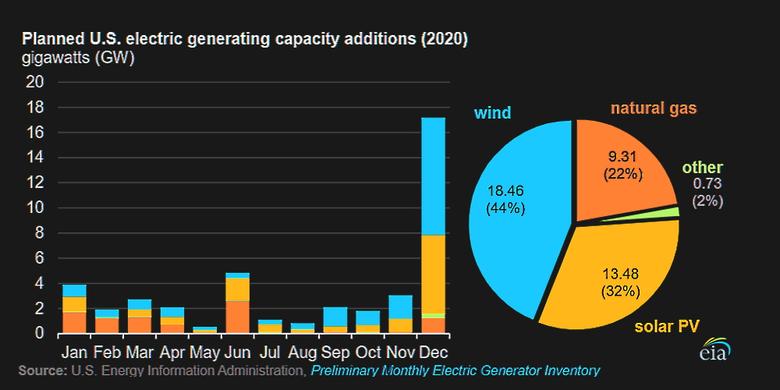
U.S. RENEWABLES NEED HELP

PLATTS - 19 Mar 2020 - Renewable energy trade groups are seeking support from the U.S. Congress as lawmakers consider possible federal aid for businesses and industries hit by the coronavirus-driven market downturn.
The push for federal aid contrasts with the stance of many U.S. oil and gas companies, which fear that government assistance to their sector will prop up less-efficient producers and bring more output into an already oversupplied market.
The U.S. Senate on March 18 passed a multibillion-dollar coronavirus relief bill that will provide paid sick leave, unemployment insurance and other assistance for workers sidelined by the outbreak. The vote came after the U.S. House of Representatives passed the legislation March 14 and following Congress' approval of an earlier coronavirus relief package in early March. The bill now heads to the president's desk for his expected signature.
Senate Majority Leader Mitch McConnell, R-Ky., nevertheless said he wants to immediately craft a "far bolder" third package to support the U.S. economy and workers. That legislation could include "targeted relief for key industries that are shouldering an outsized burden from the public health directives and which our nation will need to be operational on the other side of this," McConnell said March 18. McConnell did not give specifics on potential aid, but airlines and the hospitality sector could be beneficiaries.
President Donald Trump has also considered federal assistance for struggling shale producers, including promoting government purchases to fill the Strategic Petroleum Reserve. However, many factions of the oil and gas sector have opposed such efforts over concerns the relief would support less-efficient companies and allow them to offer more production into an already oversupplied market.
Despite hesitation from some parts of the oil and gas industry to federal aid, renewable power trade groups appear unified in wanting help as the coronavirus pandemic slows demand and keeps workers away to avoid the virus's spread.
MULTIPLE IMPACTS
"Subsequent legislative action to address the broader economic fallout of this crisis must consider the immense consequences being felt by the solar industry," said Abigail Ross Hopper, president and CEO of the Solar Energy Industries Association. "Early results from a survey of our companies confirm some of our worst fears. Customer demand for solar has plummeted and companies are seeing significant construction slowdowns, project cancellations, labor shortages, and a host of logistical problems tied to equipment and delivery delays."
The American Wind Energy Association said the spread of the disease is threatening jobs and investment for its members, and the group is working to find ways to address the challenges posed by the pandemic.
"We are sharing with [Capitol] Hill ideas to provide added certainty and enable these projects to proceed so the jobs, community benefits, and economic investment from wind energy can continue to flow into rural communities and manufacturing centers across America," said Amy Farrell, the association's senior vice president of government and public affairs.
What shape any relief could take is yet to be determined. The American Council on Renewable Energy has called for Congress to enact and extend clean energy tax incentives in any virus-related economic stimulus measures. With Congress facing gridlock on broader climate policies that could spur additional renewable generation growth, those companies have made additional or extended tax breaks a key legislative priority.
But clean energy developers have struggled on that front. In late 2019, Congress agreed to a one-year extension to the federal wind energy production tax credit as part of an end-of-year appropriations bill. But the legislation excluded other long-sought clean energy priorities, including an investment tax credit for stand-alone energy storage projects, a higher cap on electric vehicles that can qualify for a car purchase tax credit, and a longer phasedown of the federal solar energy investment tax credit.
The American Council on Renewable Energy's president and CEO, Gregory Wetstone, said supply chain disruptions could make qualifying for time-sensitive credits difficult at the same time as available tax equity for renewable projects could decline if lower profits discourage tax equity investors. As a result, the group is "urging Congress to extend the start construction and safe harbor deadlines to qualify for renewable tax credits to accommodate pandemic-related disruptions, and for renewable credits to be made available for direct pay to facilitate their monetization," Wetstone said.
POLITICAL HEADWINDS
Proposed government relief, whether for shale producers or renewable energy companies, could face an uphill climb in Congress despite the urgency to offer targeted support to businesses.
Democrats in the House and Senate have decried potential aid for oil and gas producers. And conservative think tanks have warned Republicans against offering help to specific parts of the energy sector, saying such a move would open the door to "bailout" requests for all types of energy resources.
Senate Republicans have said the third coronavirus stimulus bill could come together as early as March 19. But early this week, committees with jurisdiction over tax credits were still assessing their options.
Michael Zona, a spokesperson for the Senate Committee on Finance, said, "Every reasonable option is on the table" for future stimulus legislation, although he did not have specifics on what that could be.
"Conversations are in their preliminary stages, so we don't have guidance on energy at this point," Ashley Schapitl, a spokesperson for the Senate Finance Committee's Democratic members, said March 16. Erin Hatch, a spokesperson for the House Committee on Ways and Means, did not have any details on what tax measures may go into future bills.
-----












